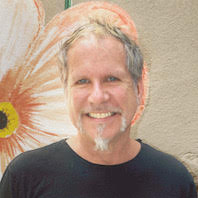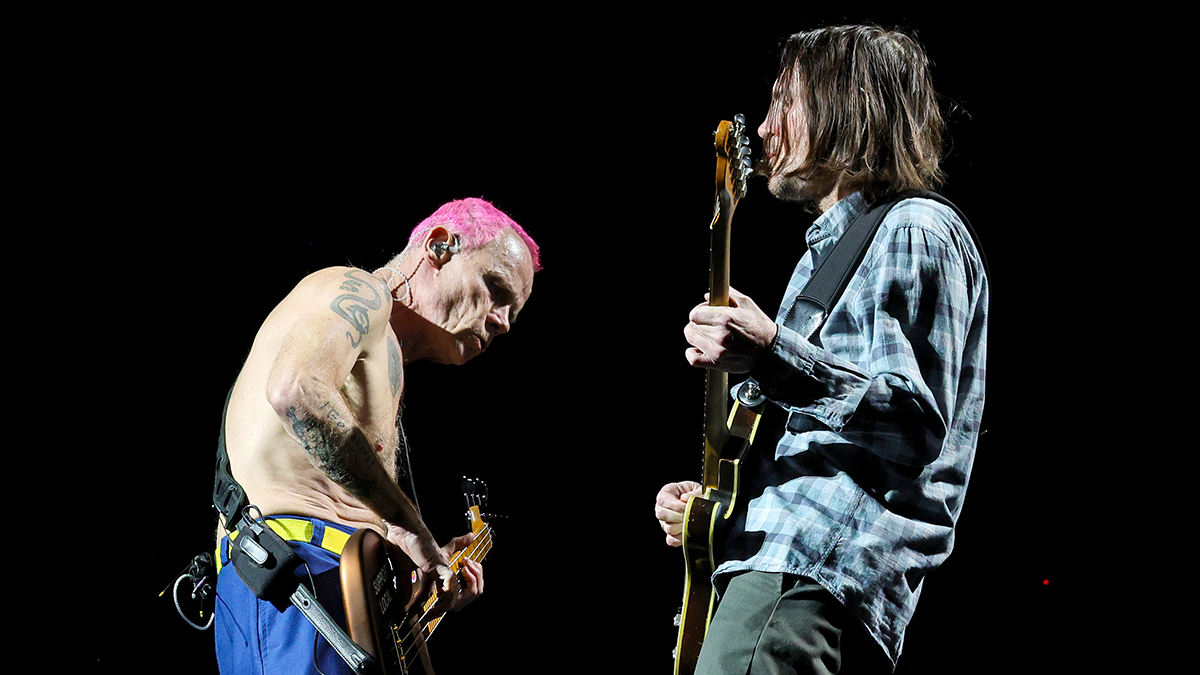Rival Sons' Scott Holiday and Jay Buchanan Delve Deep into Their Primal New Album, 'Feral Roots'
"It’s not a roots record, but it has an inherently rootsy feeling.”
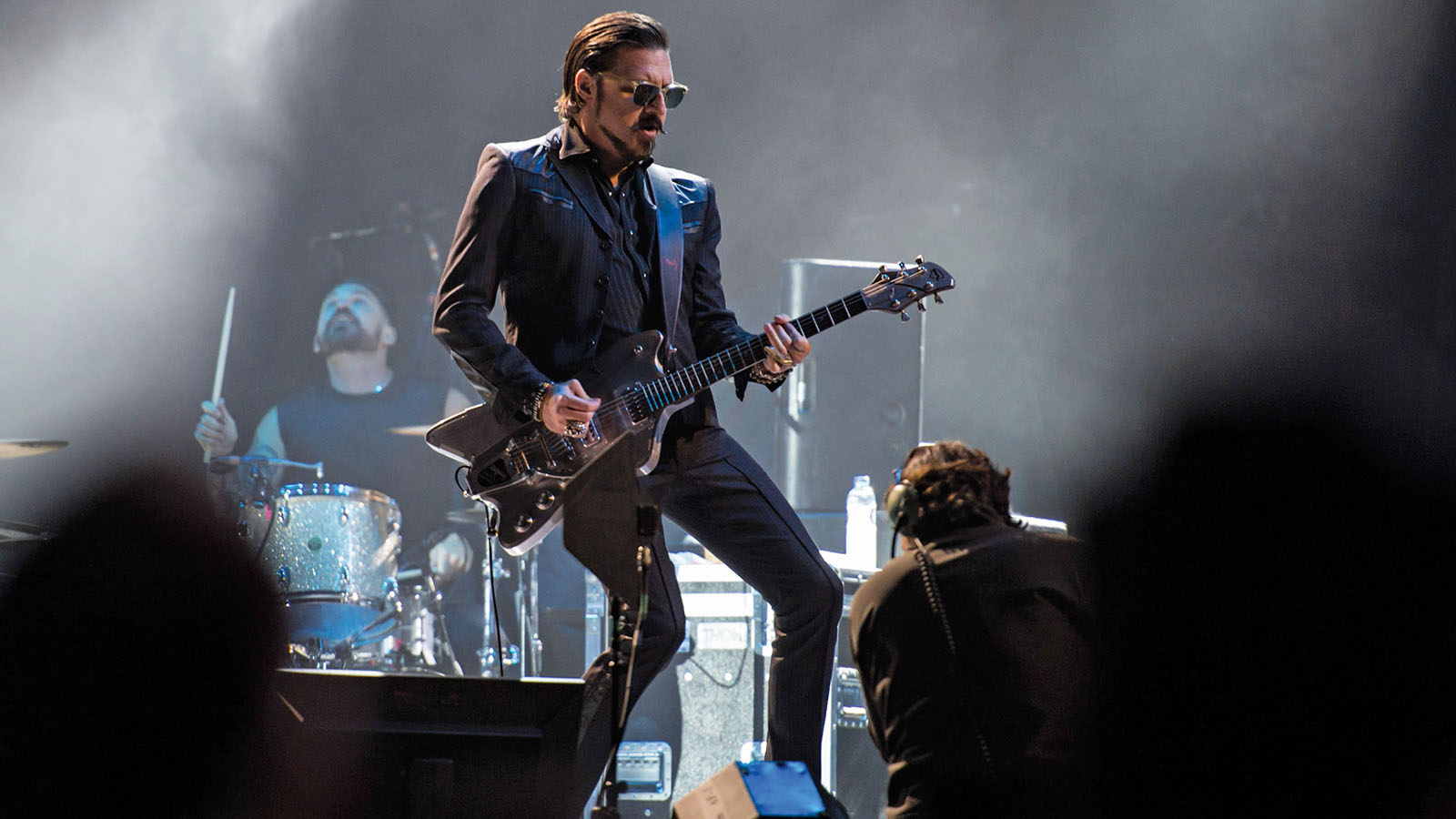
All the latest guitar news, interviews, lessons, reviews, deals and more, direct to your inbox!
You are now subscribed
Your newsletter sign-up was successful
It’s been two long years since Rival Sons released their last album, Hollow Bones — a lifetime ago for the normally prolific band. They had a legitimate excuse, though. Black Sabbath, the godfathers of metal, wanted them as support for the entirety of their year-long historic farewell tour, and what truly righteous group is gonna say no to that? Certainly not these hardrocking Sons.
But as soon as the tour wrapped, they knew they had to get down to business — and the stakes were high. After years of building a solid reputation on the independent label, Earache, the band signed to Atlantic, the major label that gave us legends like Led Zeppelin, AC/DC, Bad Company and Rush. It was time to step up… but not before they took a step back.
The band’s chief songwriters, singer Jay Buchanan and guitarist Scott Holiday, decided to take a short pause to seriously reflect on where they had been and where they were going. In September 2018, the duo headed out to a vacant shack in the south Tennessee woods just off the Natchez Trace, an historic forest trail created centuries ago by Native Americans that extends some 440 miles from Mississippi to Nashville.
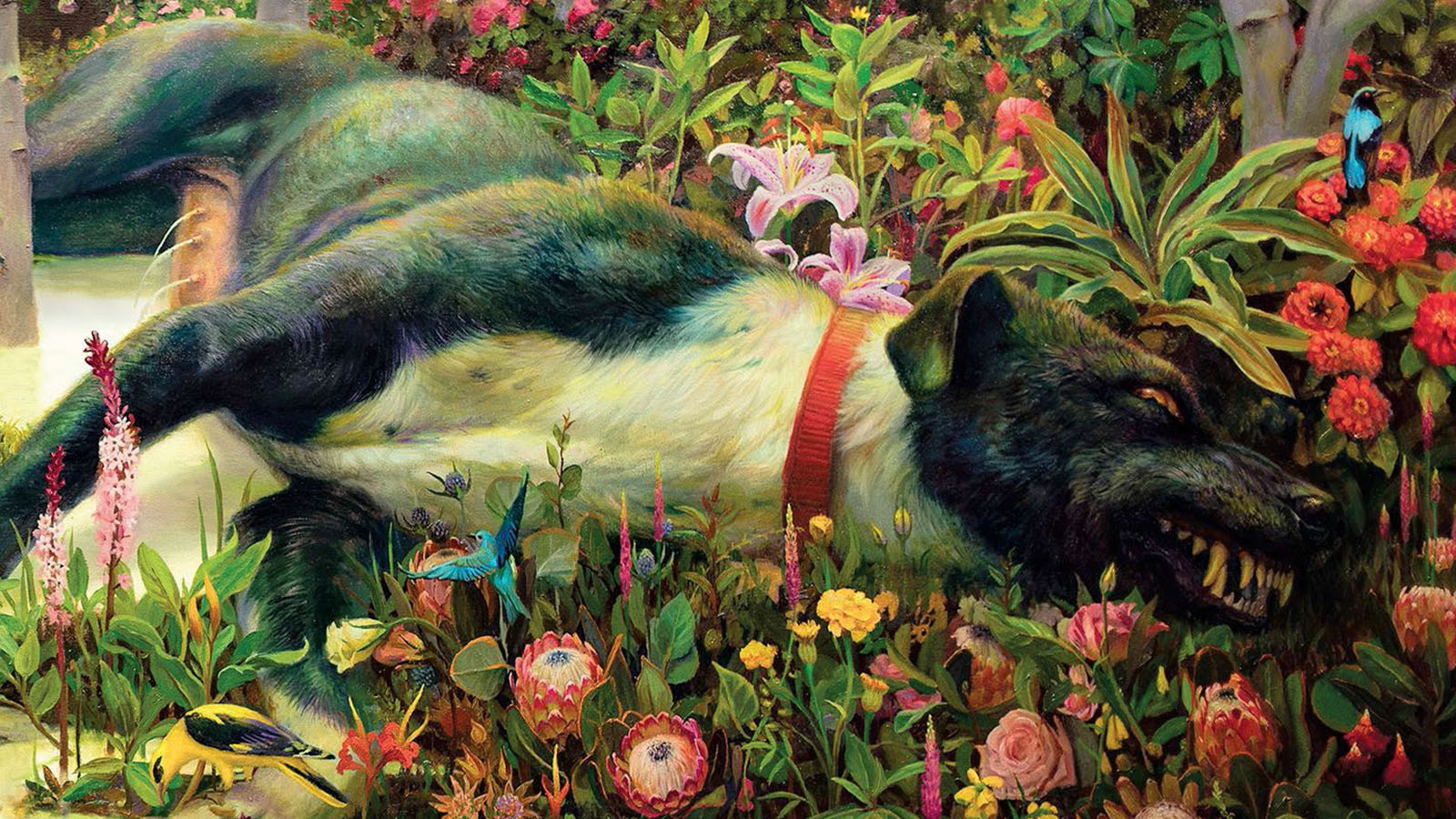
“We stayed in a cabin down at the end of causeway peninsula,” Buchanan says. “We were surrounded by water and there was no cell phone reception, no WiFi, no nothing. It was just us and a network of lakes overgrown with lily pads, snakes, spiders and woodland creatures. We brought some guitars and a couple of amps, but more than anything, Scott and I discussed what we were both looking for from ourselves and from the band. And within that framework, we started writing a bunch of songs.”
From those swampy origins, filled with funk, dirt, insects and ancient spirits, sprang the band’s new release, the appropriately titled Feral Roots. The album kicks off with a series of classic big-ass riff rockers like “Do Your Worst” and “Back in the Woods” but quickly evolves into something deeper. Like a mythical forest, as Feral Roots progresses, the music becomes more dense and interesting, beckoning the listener to look around each dark corner to see what unfolds next. Beautiful and intense, tracks like the title song, “Imperial Joy” and “All Directions” balance acoustic interludes and colorful textures, with sucker-punch moments of power fueled by guitarist Holiday’s imaginative use of fuzz and sonic ingenuity. From a guitar perspective, the album slowly lures you in and dares you to get lost in its details.
“This album does have a spooky undertone,” Holiday says. “When we were writing at the cabin, we’d notice a dilapidated boathouse crumbling in the distance on this lake and wonder if someone’s been murdered in it. It was super eerie and strange, but also very beautiful out there. Bald eagles flying over the lake and the mountain range, flying next to us... It’s not a roots record, but it has an inherently rootsy feeling.”
Holiday has a point. Even though Feral Roots was recorded in Nashville and produced by Dave Cobb, best known for producing such new wave country artists as Sturgill Simpson, Chris Stapleton and Jason Isbell, it is not what anyone would call “Americana.” It’s a rock record through and through — and a very good one — that manages to sound huge, modern and real all at the same time.
All the latest guitar news, interviews, lessons, reviews, deals and more, direct to your inbox!
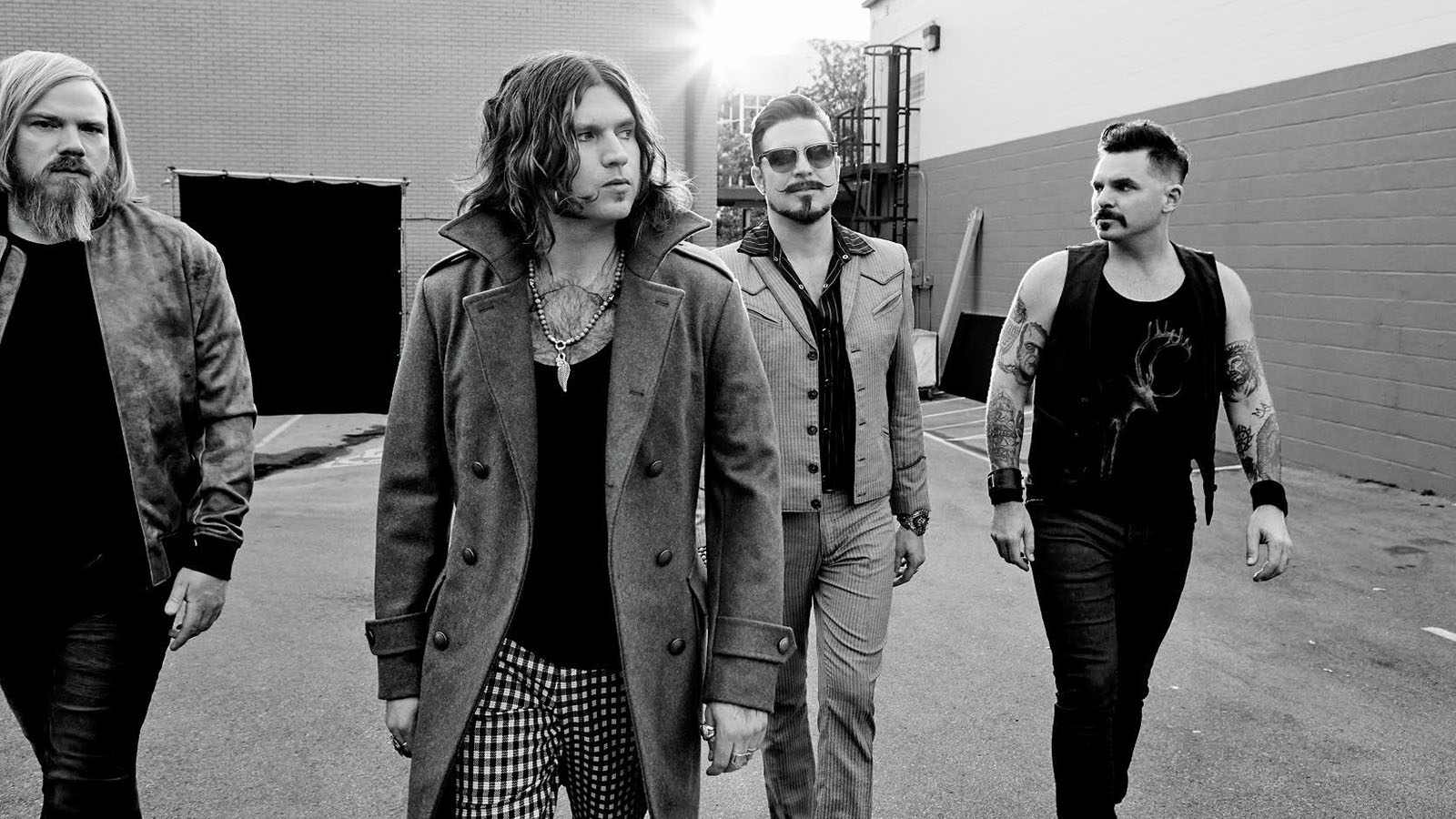
The first thing any guitarist is going to want to know is how did you make this record sound so big, but still natural?
SCOTT HOLIDAY Well, Dave Cobb is a great producer, and a lot of his techniques are his little secrets, and he doesn’t always share them with us! But overall, we just tracked in RCA’s Studio A in Nashville, which sounds amazing to begin with, and used that classic Glyn Johns distant-mic’ing technique on the drums.
In my opinion, big guitar sounds are created with great mic’ing, and the idea that cleaner guitars will always sound bigger than distorted guitars. An AC/DC sound is going be bigger than a Korn sound all day, every day. I also try not to overly stack my guitars. It’s going be one clean live amp and maybe something with a fuzz on it.
A common mistake guitarists make is they think that to make a guitar sound big, it should occupy all frequencies, which is ridiculous. If you’re using subsonic frequencies in your guitar sound, where does the bass go? Music is a dance of frequency and vibration, so if one person is dancing all over the floor like a bull in a china shop, it doesn’t allow other musicians to dance with them, and the overall sound will usually be a mess. If you learn to coexist beautifully, everything is going to sound amazing. No offense to Mesa Boogie, they make great stuff, but I’m in no need of a Triple Rectifier head.
So what gear did you use?
HOLIDAY I used a new 50-watt Supro Statesman on almost the whole album, along with my two primary guitars, a Doug Kauer Super Chief and Blue Penguin made by Gretsch’s Master Builder, Stephen Stern.
That’s a weird fuckin’ setup, my friend.
HOLIDAY I know. That’s the way I’m built. I gotta go somewhere weird, and that’s just what happened. The chief designer at Supro, Tommy Elliot, came out to see us play with Sabbath and told me they designed the Statesman with me in mind. That was a huge compliment and they sent me the first one, and I’ll be damned if it didn’t sound great on almost everything.
I also can’t say enough good things about my Kauer Super Chief guitar. That shit is magic! It’s a semi-hollow guitar with Wolfe-tone pickups and it’s so versatile I can do anything with it. When I’m using it in the studio, it has so many sounds I rarely switch for different tracks. In addition to just a great standard sound, it has a coil split, phase reverse and a bunch of other options.
And the Blue Penguin is a full-on Cadillac. Gretsch guitars can sound a little airy, but my Penguin has these TV Jones Power’Tron pickups that are super meaty and tough. It really has an individual sound. Between that amp and those two guitars, I had almost enough variation for the entire album.
Jay, it feels like you’re reaching for a new level of commitment and technique in your vocals. Your performances on “Back in the Woods” and “Feral Roots” are explosive.
JAY BUCHANAN I can say that I very might well have fucked myself very badly in the studio, because I’ll need to convey these songs night after night at that same level of intensity. They’re going to be very demanding. I challenged myself as much as I could on this record.
Is there a singer — male or female — that conveys that emotional and personal energy in a way you admire?
BUCHANAN There are many aisles in that grocery store for me, but Van Morrison comes to mind. His heart and his mind are directly connected to his voice, and there’s no doubt about it. People don’t understand how sophisticated that is. They don’t understand everything that it takes and everything that’s drawn on to perform and to live that way. When it’s time to wail and scream, he does it masterfully. He doesn’t do it for effect; it has real purpose. I probably relate to his approach much more than any of the regular blue-eyed soul vocalists that people would think I draw from.
Scott, how did you specifically get that guitar sound on “Back in the Woods”? It has a great mixture of clarity and distortion.
HOLIDAY It’s a combination of a couple of sounds. One of them is the Super Chief through a vintage EQ pedal that we ran directly into the board. It’s one of Cobb’s secret weapons. You can hear that he messes a bit with the notch filtering on the pedal while I play. It creates this little “whoosh” in certain spots and makes the guitar really cut through without using a fuzz. On a separate track, I just play my Gretsch through the Supro. Even though it’s just two guitars, the combination of the natural amp sound on the Statesman, mixed with the edgy cut of the direct sound, and some inverted chord shapes, you pretty much cover the entire sound spectrum.
Chord voicings are another important element in achieving a big sound. You can’t discount that effect. When I’m playing a straight C5 barre chord, I’ll often just toss in that low G on E-string, as well. It’s subtle, but it makes a difference.
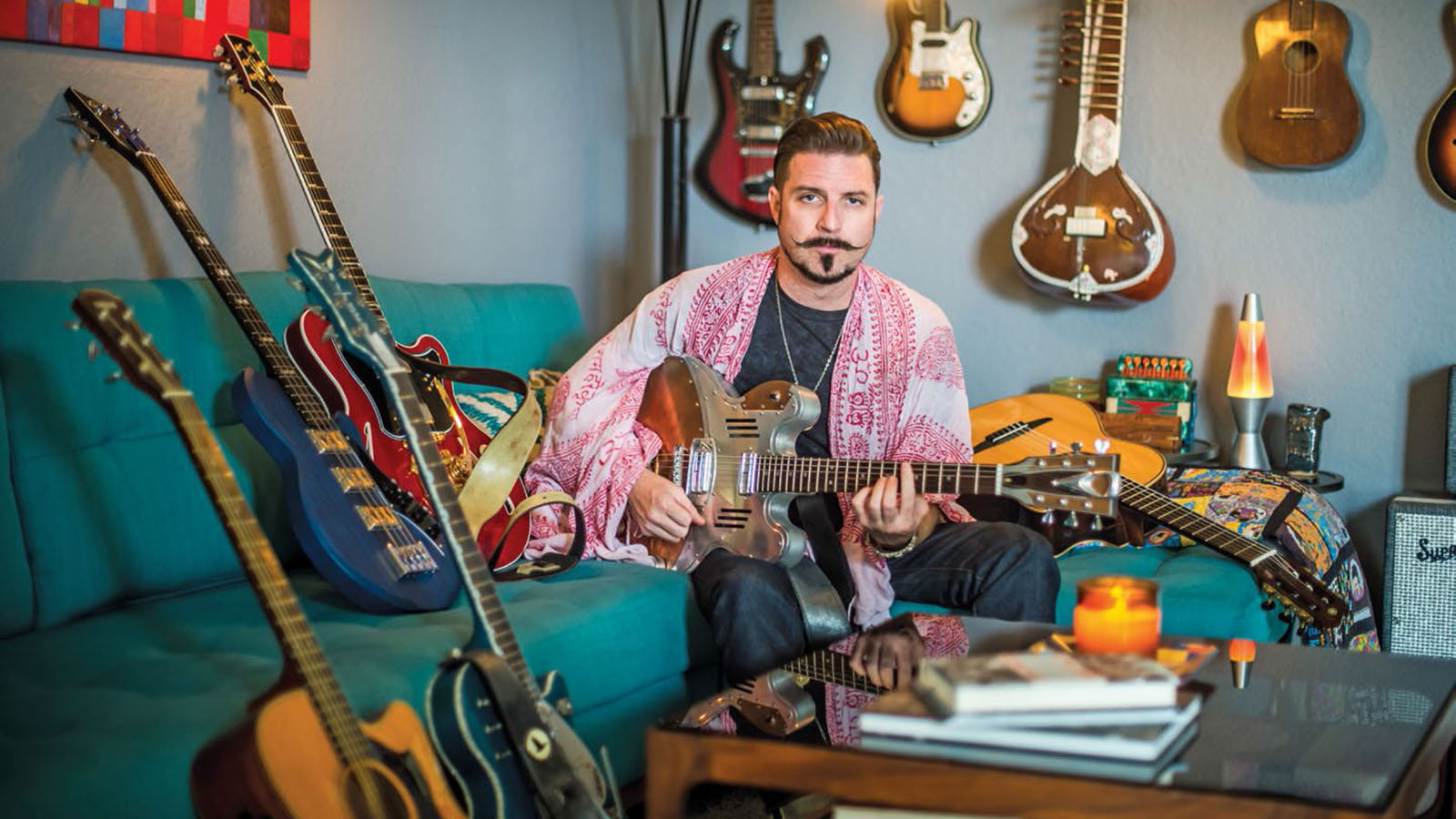
That kind of orchestration gives the listener the illusion that they’re hearing one gigantic guitar.
HOLIDAY That’s the idea. Playing in the studio and playing live are two entirely different animals. Getting a great sound in the studio is an almost cinematic process. When you’re watching a movie and see this beautiful scene, it often feels like the camera is just catching something that happened in the real world. You don’t see all the lighting people, or consider the camera angles or how many takes were done, it just feels natural, uninhibited and easy. It’s the same way in the recording studio. A lot of different things go into making a guitar sound natural and have the impact that it does.
At the same time, you mentioned that the energy of many of these tracks comes from the band playing live in the studio.
HOLIDAY That’s the foundation. I think it’s mandatory. At its core, rock and roll should be people in a room looking at each other and making a sound. It’s gotta have that bravado. But that doesn’t mean you can’t finesse other things later. You can sharpen the corners, or make things sound a little larger, but I listen to music because I want “the human.” That’s the corner we stand in and that’s the torch Rival Sons hold high.
Some would argue that that’s precisely the reason rock has faded from the mainstream. It seems like the current cultural preference is for those slick, super-shiny, studio-oriented productions you hear in pop and hip-hop.
HOLIDAY I assure you that rock and roll has a seat at the table, and it will become more important and relevant as music moves on. I can feel it. We’re gonna look back and be embarrassed by how pop became so cheap. I’m not sure how anybody can think it’s cool to have 50 producers work on a track that is little more than a drum machine, four backup singers and a pop singer who constructs their performance line by line. That shit’s ridiculous. It’s fucking corny. The musicians are like robots on an assembly line. I don’t want “the robot.” That process is like fucking Skynet, dude! We all saw the Terminator movies and know how that ends.
That takes us back to the organic theme of Feral Roots. All these robots…it kinda makes you want to throw your iPhone into a creek!
HOLIDAY [laughs] I wanna do that shit every day! Are you kidding me?
The idea of getting back to nature, or a more natural life, is a constant theme on the album. Jay, was there something that triggered those lyrics in your personal life?
BUCHANAN I grew up in the Southern California woods at the foot of the Mohave Desert, and it doesn’t leave you. You carry that tranquility everywhere you go. Recently, I bought a home out in the Tennessee woods, and that was a milestone I had been waiting for my entire adult life. It absolutely informed everything on the album.
It helped me to be more introspective in a healthy way, because I was surrounded by that which created us, as opposed to being around man-made creations. In the city, we construct our own world, from our forks and dishes to the technology we use for communication. But in the wilderness, we’re with the spirit that created us, and whenever I feel like I can’t get my head screwed on straight, my tendency is to look toward that. I think it helped to make a very panoramic view of who the band is these days.
The further we move through this increasingly global culture, the more we begin to recognize some of these growing pains. We’re starting to really ask ourselves those existential questions about what this constant communication ultimately leads to. For those of us that care, we understand the need to be more protective of the self. I’m not suggesting we need to permanently unplug — I don’t have any wish to be a spokesman for the Luddites — but, it’s about keeping yourself in check. At some point, everybody needs to be able to take off their shoes and feel earth beneath their feet, or else you’ll just crack up.
I mean, the Rival Sons are a global business, so dealing with technology is important! But there are times when you gotta say, “Man, I need to live my life in a way that suits my nervous system and nourishes me mentally and spiritually.” I think more and more people are going to be compelled to figure that out. I don’t have a clear answer to tell people, but it’s not a crime to raise those questions.
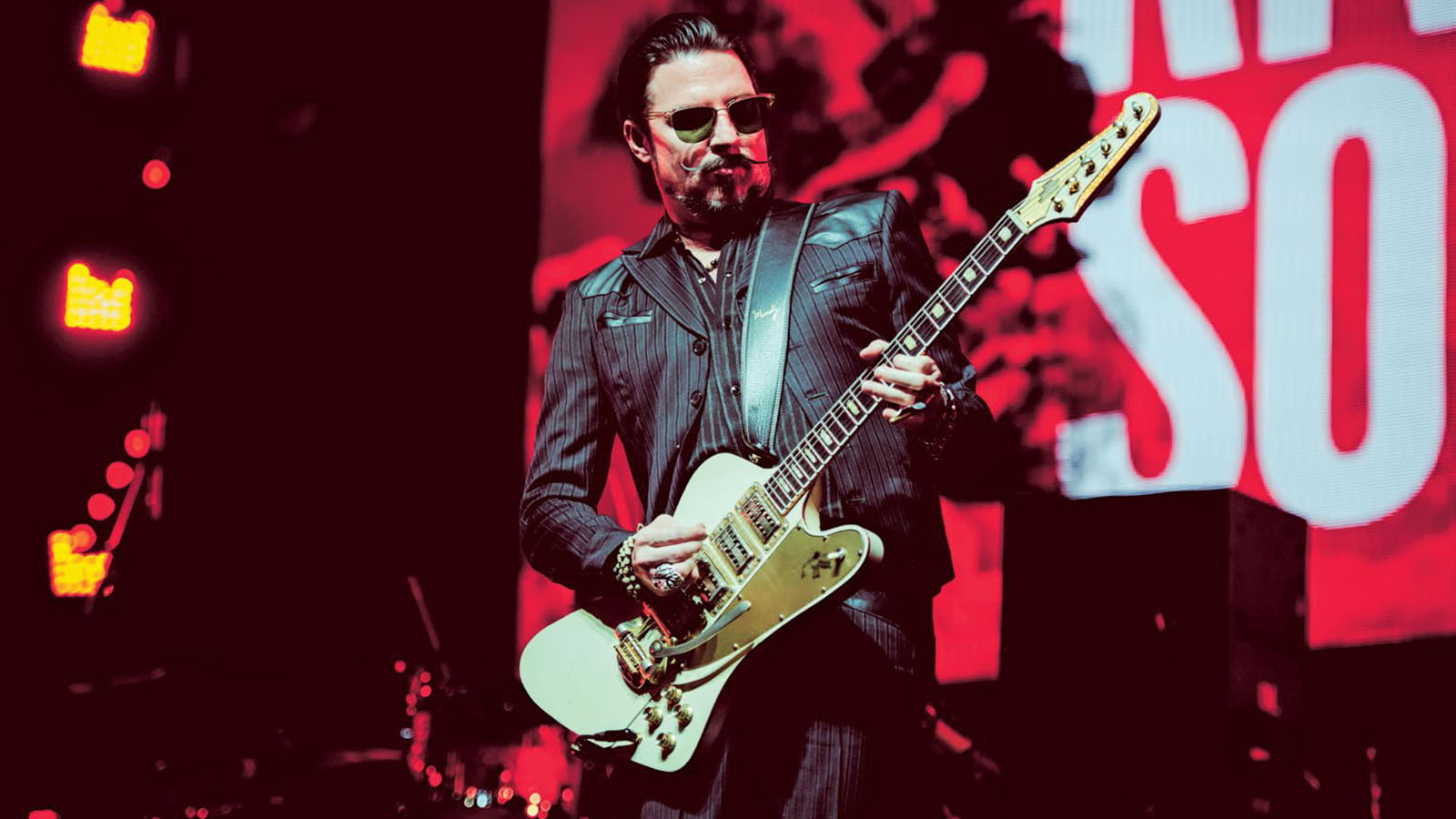
Both of you guys are strong characters. Is it difficult to share songwriting duties?
HOLIDAY Jay is a massive writer and he is also a very good guitarist, but we make it a point to work on Rival Sons material together. I’ll start song ideas up and not finish them on purpose. That might sound like I’m being lazy, but I know myself. If I finish a song by myself, it becomes slightly precious. It means I’ve gone around the horn thinking about what I wanted to do and changes I wanted to make, and I’ve edited it several times until it’s a complete statement. So, when someone goes, “Yeah, I think that’s good, but it needs a real chorus.” You’re like, “What? Fuck you, this is a good chorus!” So, when it comes to material for Rival Sons, I’ll just pull some general ideas together and wait for Jay. It gives him room to contribute and for me to be malleable.
BUCHANAN It’s important to note that from the band’s inception, Scott and I have both been drivers. But just like any other partnership, if something’s very important to your collaborator, you need to have the maturity to look at it, and say, “Well, this is very essential to him, and it’s more important to him than it is to me.” That’s when you concede on issues like that, because it helps create a healthy environment of growth and it bolsters trust, which is extremely important when you work together.
For example, I had been working on a new song. I had the narrative, and had written verses and everything. I played it for Scott and he liked it right away. He asked me what it was called, and I said, “Feral Roots.” He’s like, “Yeah, man. That’s great.” So, to some degree, we were content for the song to live as it was. But after thinking about it, I give him a call and said, “Look, man, this sounds too much like a Jay Buchanan track. It needs your hand on it. Why don’t you write a chorus? Or put something on it?” He liked the way the song was, but he just said, “Sure.”
To give someone something that you feel is a complete statement takes an incredible amount of trust, and Scott didn’t miss a beat. Within 24 hours he turned it back around and sent me these guitar parts that were perfectly in line with a melody I had written for a chorus. You don’t plan for something like that to happen, but when it does, you’re sure as fuck thankful!
A long time ago in a galaxy far, far away Brad was the editor of Guitar World from 1990 to 2015. Since his departure he has authored Eruption: Conversations with Eddie Van Halen, Light & Shade: Conversations with Jimmy Page and Play it Loud: An Epic History of the Style, Sound & Revolution of the Electric Guitar, which was the inspiration for the Play It Loud exhibition at the Metropolitan Museum of Art in New York City in 2019.
